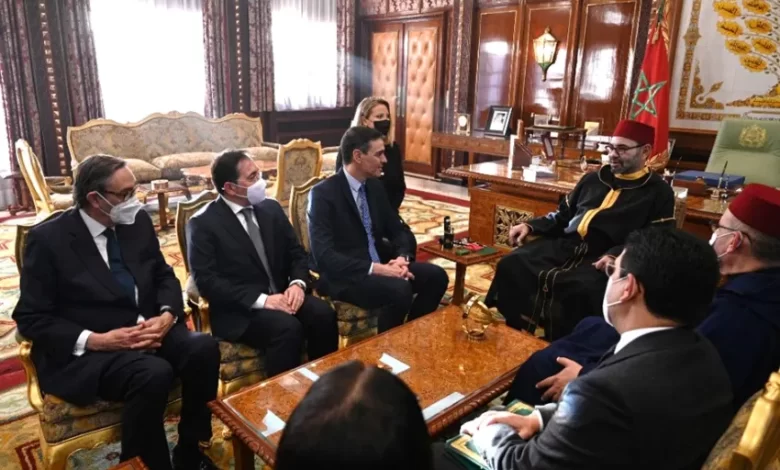Relations between Morocco and Spain enter a new phase of partnership

Relations between Morocco and Spain are entering a new phase of cooperation in various fields, amid a convergence of views imposed by the change of Madrid’s position on the Moroccan Sahara issue and support for the autonomy project, which opens the way to an unprecedented strategic partnership that will be strengthened by the signing of several agreements, including 24 agreements to facilitate Spanish investments in Morocco.
Spanish Prime Minister Pedro Sánchez visited Rabat on Wednesday to take part in a high-level bilateral ministerial meeting to promote the strategic partnership between the two countries.
Sánchez was heading a government delegation composed of several ministers to meet with their Moroccan counterparts on Thursday at the high-level meeting, which has not met in eight years.
The high-level meeting between the Moroccan and Spanish governments reflects the reconciliation they reached last March, when Sánchez declared Spain’s support for Morocco’s autonomy proposal for a single solution to the conflict in the Moroccan Sahara.
On Thursday, Sánchez visited the tomb of late King Mohammed V, where he paid tribute to the souls of King Mohammed V and King Hassan II and placed a wreath of flowers on their graves before placing it in the golden book.
In a phone call to the Spanish prime minister shortly before his arrival in Rabat, King Mohammed VI hailed the “new phase of bilateral partnership” between the two neighbors, a palace statement said.
The Moroccan monarch also invited the head of the Spanish government to visit the Kingdom again “as soon as possible,” in order to “strengthen bilateral relations with concrete projects in various fields.”
For his part, Moroccan Prime Minister Aziz Akhannouch hailed, during the Moroccan-Spanish Economic Forum held Wednesday in Rabat, the development of relations between the two countries, saying that they are “deep and close” and that they have entered a new stage with the support of the Spanish authorities for the autonomy project.
The Moroccan news website Hespress also praised the courage of the Spanish government in adopting the autonomy plan, stressing that the economic forum will be “an opportunity to reinforce and strengthen economic partnerships and accelerate the pace of joint investment in light of the political dynamic in relations between the two countries.”
“Relations between Morocco and Spain are deep and close,” he said, adding that “exchanges between Morocco and Spain are rich and constantly being renewed.”
Referring to the difficulties experienced by the relations between the two countries and their success in overcoming them, he said, “If these relations have suffered, at times, from misunderstanding, we have always found ways to overcome them.”
Akhannouch also spoke of strengthening cooperation with Spain in the fight against terrorism by dismantling ISIL terrorist cells and in the case of irregular migration, by “successfully preventing 63,000 illegal migration attempts and dismantling 250 migrant smuggling networks in 2021.”
The migration issue is a strategic one in relations between the two countries, with the flow of irregular migrants to Spain decreasing by 25 percent in 2022, according to official Spanish figures, thanks to the resumption of security cooperation between the two countries in this area.
Addressing the issue of energy cooperation with Spain, Akhannouch pointed to the importance of the Maghreb-European gas pipeline, which enabled Spain to supply gas for 25 years through Moroccan territory.
Referring to Algeria’s cutting off of Spain’s gas to its new position on the Sahara issue, Akhannouch said, “Given the current geopolitical situation, our two countries have shown a high sense of cooperation and flexibility by maintaining this line and reversing the pipeline flow in order to supply Morocco with liquefied natural gas through Spain.”
This rapprochement between the two countries also comes in the context of chilled relations between Rabat and Paris, Morocco’s other historical partner.
Morocco’s political class and local media have accused Paris of being behind a recent recommendation by the European Parliament on press freedom in Morocco and allegations that European parliamentarians were bribed in an attempt to put pressure on Rabat. The Spanish Socialist MEPs voted against this text, which reveals the extent of the development of relations between the two countries, which have reached strategic stages.
“The better the relations between Morocco and Spain, the better for Spain, Morocco, Europe, business and citizens of both countries,” Sánchez said at the close of the economic forum.
Twenty-four agreements are expected to be signed on Thursday to facilitate Spanish investments in Morocco and establish partnerships in the fields of education, culture, water desalination and rail transport, according to Spanish government sources.
The two sides will initialize an agreement for “the full normalization of the passage of persons and goods through customs and land and sea ports”.
The opening of land crossings concerns the enclaves of Ceuta and Melilla (whose customs office has been closed since 2018), located in northern Morocco.
King Mohammed VI has said the Moroccan Sahara issue is Morocco’s vision of the world.












